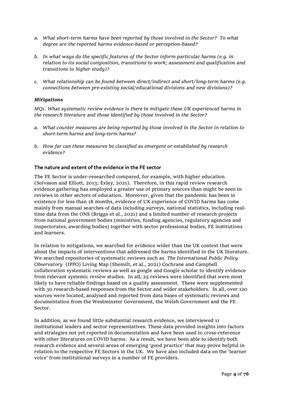
Page 4 of 76
a. What short-term harms have been reported by those involved in the Sector? To what
degree are the reported harms evidence-based or perception-based?
b. In what ways do the specific features of the Sector inform particular harms (e.g. in
relation to its social composition, transitions to work; assessment and qualification and
transitions to higher study)?
c. What relationship can be found between direct/indirect and short/long-term harms (e.g.
connections between pre-existing social/educational divisions and new divisions)?
Mitigations
MQ1. What systematic review evidence is there to mitigate these UK experienced harms in
the research literature and those identified by those involved in the Sector?
a. What counter measures are being reported by those involved in the Sector in relation to
short-term harms and long-term harms?
b. How far can these measures be classified as emergent or established by research
evidence?
The nature and extent of the evidence in the FE sector
The FE Sector is under-researched compared, for example, with higher education
(Solvason and Elliott, 2013; Exley, 2021). Therefore, in this rapid review research
evidence gathering has employed a greater use of primary sources than might be seen in
reviews in other sectors of education. Moreover, given that the pandemic has been in
existence for less than 18 months, evidence of UK experience of COVID harms has come
mainly from manual searches of data including surveys, national statistics, including realtime
data from the ONS (Briggs et al., 2021) and a limited number of research projects
from national government bodies (ministries, funding agencies, regulatory agencies and
inspectorates, awarding bodies) together with sector professional bodies, FE institutions
and learners.
In relation to mitigations, we searched for evidence wider than the UK context that were
about the impacts of interventions that addressed the harms identified in the UK literature.
We searched repositories of systematic reviews such as The International Public Policy
Observatory (IPPO) Living Map (Shemilt, et al., 2021) Cochrane and Campbell
collaboration systematic reviews as well as google and Google scholar to identify evidence
from relevant systemic review studies. In all, 25 reviews were identified that were most
likely to have reliable findings based on a quality assessment. These were supplemented
with 30 research-based responses from the Sector and wider stakeholders. In all, over 120
sources were located, analysed and reported from data bases of systematic reviews and
documentation from the Westminster Government, the Welsh Government and the FE
Sector.
In addition, as we found little substantial research evidence, we interviewed 11
institutional leaders and sector representatives. These data provided insights into factors
and strategies not yet reported in documentation and have been used to cross-reference
with other literatures on COVID harms. As a result, we have been able to identify both
research evidence and several areas of emerging 'good practice' that may prove helpful in
relation to the respective FE Sectors in the UK. We have also included data on the 'learner
voice' from institutional surveys in a number of FE providers.